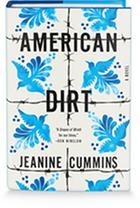
Lydia Quixano Perez is jolted from her comfortable middle-class existence in Acapulco when she becomes the target of a drug cartel boss's wrath. His reach is far and his influence is wide. Mexico is no longer safe for Lydia. She's left with no choice but to flee for her life and that of her eight-year-old son, Luca. So they head for the United States and the hope of refuge. Jeanine Cummins (A Rip in Heaven; The Crooked Branch) tells the harrowing story of their journey with chilling detail and a pace as urgent as her characters' predicament. American Dirt is a novel chronicling the determination of those seeking a chance at life in a world doing everything it can to ravage them.
Before their lives are turned upside down, Lydia enjoys her days running a bookshop in Acapulco. They become even better when a new customer shows interest in some of her favorite books. Their conversation at the check-out counter turns into an invitation for her patron, Javier, to return so they can discuss books. One visit turns into two, and soon into weekly visits and a budding friendship.
Until Lydia learns the identity of her fellow booklover: he is the jefe of Los Jardineros, a Mexican drug cartel.
Lydia's husband, Sebastián, is a journalist. As the people of Acapulco grow numb to the violence consuming their city, he works tirelessly to report it, attempting to keep the atrocities from becoming normalized. He and Lydia take precautions when he publishes stories, but the cartel doesn't show much interest in Sebastián or his work. However, an exposé on Javier changes all that and forces Lydia out of the only life she's ever known.
Cummins puts her readers up close and personal as Lydia and Luca navigate life as refugees. Her attention to the minutiae renders a feeling of authenticity as well as terror. Where will they sleep, and will they stay safe when they do; how can they access money without drawing attention to themselves; and who can they trust in their efforts to stay alive--these are all problems they must face. Mother and son, accustomed to the comforts and amenities middle-class life affords them, must come to grips with who they are now: "When the idea first occurred to her as she squatted in the shade of the oficina del registro civil, it occurred as camouflage: they could disguise themselves as migrants. But now that she's sitting in this quiet library with her son and their stuffed backpacks, like a thunderclap, Lydia understands that it's not a disguise at all. She and Luca are actual migrants... that simple fact, among all the other severe new realities of her life, knocks the breath clean out of her lungs."
Especially daunting are Cummins's scenes involving la Bestia, the train Lydia and Luca must jump in order to make their way north. There are many dangers associated with the train, but the first is simply getting on it. One false move and the journey is over permanently. Two young Honduran sisters teach Lydia and Luca the art of boarding la Bestia and become their traveling companions. Soledad and Rebeca are running from their own monsters and, as young Luca learns bits and pieces of their story, "he starts to understand that this is the one thing all migrants have in common, this is the solidarity which exists among them, though they all come from different places and different circumstances, some urban, some rural, some middle-class, some poor, some well-educated, some illiterate, Salvadoran, Honduran, Guatemalan, Mexican, Indian, each of them carries some story of suffering with them on top of that train and into el norte beyond."
Violence, kidnapping, theft, Cummins paints all of the horrors of the migrant's ordeal with such realism readers can't help but feel a dreadful sense of anxiety. When the travelers are cornered by corrupt police officers, a curtain of darkness envelops the story: "There are at least four policía standing in the back of each truck, plus more inside, and they're all kitted out like they're going to war.... They wear boots and kneepads and helmets and giant, studded Kevlar vests and gloves and dark black visors so you can't see their eyes, and their faces are entirely covered by black balaclavas. Each one of them has weapons strapped all over his body and... Luca can't even begin to imagine what they'd need all that weaponry for, just to catch a few migrants...." Contrasting the diabolical image of the police, Cummins infuses her protagonists with humanity--a mother's will to protect her son, a bond between sisters, the pain of shattered innocence--forcing her audience to see the individuals and their struggles rather than a fabricated security threat.
American Dirt will punch you in the gut one minute and fill you with hope the next. The stirring descriptions, complex characters and heart-pounding race to stay alive combine for a gripping plot, while the themes of injustice and human determination take it to a much higher level than an average thriller novel. This is an important story being told at a vital point in time. On one hand it's a single woman's plight, but on the other, it's the human condition. Powerful! --Jen Forbus

